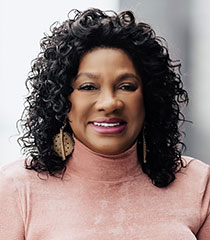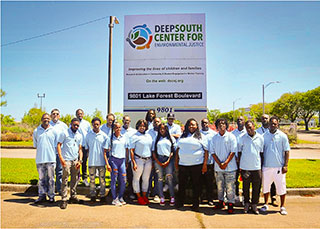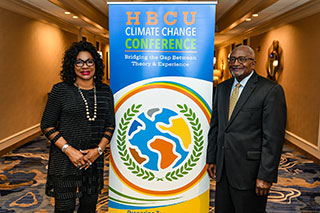December 1, 2022

Beverly Wright, Ph.D., founder and executive director of the Deep South Center for Environmental Justice (DSCEJ), is working to address environmental and health inequities for communities in the Gulf Coast Region of the U.S.
Wright grew up close to a highly polluted area in Louisiana known as the Mississippi River Chemical Corridor, an 85-mile stretch of land between Baton Rouge and New Orleans, which contains hundreds of petrochemical plants and refineries. This corridor is also known as Cancer Alley due to the many hot spots of reported cases.
“As a child, I remember everyone called the stench from the chemical plants, ‘the smell of progress’,” Wright said. “But fast forward decades later, what the community thought was helping them financially, was killing us – some faster than others.”
Later while pursuing her doctoral degree in sociology, Wright noted that low-income groups and people of color faced significant risks to environmental threats. These risks were often compounded by pollution in their neighborhoods and other hazards in their homes and workplaces.
Today, Wright directs activities of the DSCEJ and partners with others in academia, communities, churches, local governments, and nonprofit organizations to address the long legacy of environmental pollution, climate change, and health disparities that impact communities in Louisiana and other Gulf states.
Building Equitable Partnerships Between Communities and Academics
When Wright founded the DSCEJ in 1992, she knew a critical aspect of its mission would involve partnership between communities and universities. However, she recognized the unequal dynamics that are often experienced between community members and university researchers when seeking to resolve environmental or public health issues. Often, researchers go into the field without understanding or appreciating the challenges and needs of communities. On the other hand, community members often feel they are seen only as research subjects rather than partners because they are left out of the process of conducting research and formulating solutions.
To address these exclusion issues, Wright developed the Communiversity Model, which acknowledges that bilateral understanding and mutual respect between these two groups is needed for effective research and decision-making. The Communiversity Model is a staple for all DSCEJ efforts surrounding research, education, and training.
“What makes the Communiversity Model different is that it intentionally creates a space for residents to speak up on issues important to them,” said Wright. “It is important to create opportunities and center research and policymaking around real-life experiences.”
Training for Environmental Careers
Many communities in the Gulf Coast region face barriers to sustainable employment. According to 2022 estimates, in Louisiana alone, approximately 3.4% of the population is unemployed and 19.6% are living in poverty.

To help overcome these socioeconomic barriers, Wright and her longtime colleague Robert Bullard, Ph.D., of Texas Southern University, direct the Historically Black Colleges and Universities (HBCU) Consortium. The HBCU Consortium focuses on delivering pre-employment and life skills training to underserved and disadvantaged individuals. The consortium is one of several grantees funded by the NIEHS Environmental Career Worker Training Program (ECWTP), administered by the broader NIEHS Worker Training Program (WTP).
The HBCU Consortium has been a part of the ECWTP for more than two decades. The consortium partners with others in academia, community and faith-based organizations, and small businesses to deliver training to individuals in New Orleans, Houston, Detroit, and Pensacola, Florida. This training enhances the workforce and increases career opportunities in the fields of environmental cleanup, construction, hazardous waste removal, and emergency response.
The HBCU Consortium also equips trainees with the skills necessary to respond to climate-related disasters and public health emergencies. Over the years, many trainees have participated in cleanup and recovery activities following the Deepwater Horizon Gulf Oil Spill, Hurricane Katrina, Hurricane Harvey, and others.
Wright also co-directs activities of the Gulf Coast COVID-19 Recovery Center along with Bullard (119KB), which was established to promote health, safety, and recovery training for workers and communities disproportionately affected by COVID-19 in Louisiana, Mississippi, Alabama, Florida, and Texas. Funded by WTP, the center delivers training on topics specific to COVID-19 awareness, vaccines, and mental health.
Spearheading Action on Climate Change and Equity

In 2011, Wright and Bullard established the HBCU Climate Change Consortium. The consortium was established to help raise awareness about the disproportionate impacts of climate change on some communities, especially those within the southern U.S.
Additionally, Wright and her colleagues sought to establish a network to develop new leaders and advocates in the space of environmental justice, climate adaptation, and community resilience.
Today, the HBCU Climate Change Consortium comprises dedicated faculty members and students representing more than 30 HBCUs across 16 states. The consortium convenes the annual HBCU Climate Change Conference which brings together hundreds of HBCU faculty and students, climate experts, and community leaders for workshops and lectures that address climate change impacts and solutions.
“It is important to connect with the communities and train the next generation of leaders on how to fight for climate justice,” Wright said. “Only by considering the perspectives of the impacted community can leaders develop research and recommendations that help empower the community to have a say in improving their environment and health.”
Wright also co-directs the HBCU-Community Based Organization (CBO) Gulf Coast Equity Consortium with Bullard, which aims to improve the health of children and families in the Gulf Coast Region. The consortium is guided by community engagement, capacity building, and science literacy principles. One of the consortium’s new initiatives, the Gulf Water Justice Strategic Planning Project, is geared towards ensuring equitable decisions and plans about water management — such as water utilities and flood mitigation — for Gulf Coast communities.
Engaging With National and International Leaders
Wright was appointed by President Joe Biden to serve as a member of the White House Environmental Justice Advisory Council. The council was established as part of Executive Order 14008, and provides recommendations on how to strengthen the federal government’s environmental justice efforts related to climate change, pollution reduction, clean energy, tribal issues, and built infrastructure.
“Equitable energy plans, local workforce training, environmental site assessments, and community-centered policies – all of these are needed to see change in communities such as those along the Mississippi River Chemical Corridor,” Wright said.
Wright and her colleagues will continue to provide guidance on federal initiatives specific to environmental and climate justice. This includes guidance and recommendations towards the Justice40 Initiative, which is one of several initiatives outlined in Executive Order 14008. This initiative aims to deliver 40% of the benefits from federal investments in climate change, clean energy, workforce development, and more to disadvantaged communities. Notably, the ECWTP was selected as one of 13 participants for the U.S. Department of Health and Human Services in the initiative.
In November 2022, Wright and her colleagues debuted the first-ever Climate Justice Pavilion at The United Nations Climate Change Conference in Sharm El-Sheike, Egypt. The pavilion was a collaboration between DSCEJ, WE ACT for Environmental Justice, and the Bullard Center for Environmental and Climate Justice. It brought together representatives from the Global South, the U.S. environmental justice movement, and Indigenous peoples to spotlight the voices of communities disproportionately impacted by climate change.


